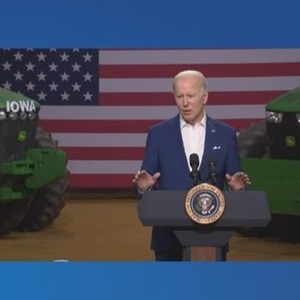Biden visits Poet plant to discuss emergency action on E15

April 12, 2022
BY Erin Krueger
President Joe Biden on April 12 visited Poet’s 150 MMgy ethanol plant in Menlo, Iowa, to discuss the U.S. EPA’s plan to issue an emergency waiver allowing E15 to be sold through the summer 2022 driving season. The emergency waiver is one component of the administration’s ongoing effort to reduce high fuel prices caused by Russia’s invasion of Ukraine.
The White House announced plans for the emergency waiver in a statement issued earlier in the day. The EPA is expected to take official action closer to the June 1 start of the summer driving season.
“I’m here today to talk about the work we’re doing to lower costs for American families and put rural America at the center of our efforts to build a future that is made in America,” Biden said. “That is not hyperbole—it’s about being made in America. A lot of that has do with this industry.”
Advertisement
Advertisement
He outlined several specific reasons the U.S. biorefining industry is important. First, he said it supports farmer and the farm economy. “Knowing you have a buyer gives farmers something you don’t often have—peace of mind, certitude about where their product can be sold and to get a fair price for it,” Biden said. Second, biorefineries create good paying jobs. “It’s estimated that there are over 400,000 jobs directly and indirectly supported by this industry nationwide,” Biden said. “That’s a lot of people and a lot of paychecks—and good decent paychecks.” Third, biorefineries reduce our reliance on foreign oil by stretching the fuel supply, and fourth, they give consumers choice at the pump, which creates competition that reduces prices, he added. “In addition to that…you get lower greenhouse gas emissions,” Biden continued, noting that biorefineries also produce important coproducts, such as animal feed.
“I’m here today because homegrown biofuels have a role to play right now as we work to get prices under control and reduce the price to families,” Biden said, adding that “Putin’s invasion of Ukraine has driven up gas prices and food prices all over the world… We need to address this challenge with an urgency… Your family budget—your ability to fill up your tank—none of it should hinge on whether a dictator declares war or commits genocide a half a world away.”
Advertisement
Advertisement
“E15 is about 10 cents per gallon cheaper than E10, and some gas stations offer an even bigger discount than that,” Biden said. “But many of the gas stations that sell it…are required to stop selling it in summer. With this waiver, on June 1, you’re not going to show up at your local gas station and see a bag over the pump that has the cheapest gas. You are going to be able to keep filling up with E15…[The emergency waiver] is not going to solve all our problems, but it’s going to help some people, and I’m committed to doing whatever I can to help.” Biden also discussed plans to invest more than $100 million to build biofuel infrastructure of through the USDA’s Higher Blends Infrastructure Incentive Program.
Allowing E15 to be sold during the summer driving season is one component of Biden’s larger effort to reduce fuel prices. The administration is also taking other actions, including the release of 1 million barrels of oil from the Strategic Oil Reserve each day for a six-month period. Other countries have made similar commitments, which together are expected to release 240 million barrels of oil into the market over a six-month period to serve as a bridge to keep prices down while oil companies ramp up production of crude oil.
Related Stories
The European Commission on July 28 approved a €36 million ($41.07 million) Danish state aid scheme designed to encourage airlines operating in Denmark to use sustainable aviation fuel (SAF) on domestic routes.
The abrupt closure announcement by Biox Corp. is the latest example of a failure to secure Canada's domestic energy supply, says Unifor. The Canadian energy union is advocating for simply regulatory changes that could help restart the facility.
Domestic production of SAF to meet 30% of New Zealand's jet fuel needs by 2050 could generate NZD 1.3 billion in GVA and create 5,700 jobs, while also strengthening fuel security, according to a Cyan Ventures study supported by Boeing.
The Civil Aviation Decarbonization Organization, and 4AIR announced a strategic collaboration between their respective SAF registries. The collaboration's key focus is on interoperability to enhance data integrity and mitigate double issuance risks.
The U.S. EPA on July 29 released a proposed rule to repeal the agency’s 2009 Endangerment Finding, which forms the legal basis for the agency’s GHG regulations. The proposal also aims to repeal all GHG regulations for motor vehicles and engines.
Upcoming Events










